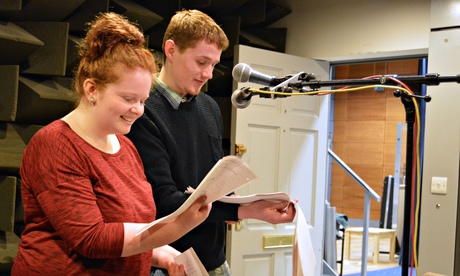
Home Front (Radio 4) | iPlayer
The Educators (Radio 4) | iPlayer
Prom 37 (Radio 3) | iPlayer
The BBC, in its steady manner, has been continuing to mark 100 years since the start of the first world war with careful, relevant programmes. The tick-tock of various documentaries and drama across all stations – Radio 1 is in the middle of a three-part series about children in war – is respectful and interesting, but mostly hasn't hit hard, doesn't knot the stomach, fracture the heart. This is partly because, in terms of anniversaries, we're at the start of the Great War, the time when much of Britain still thought it might not happen and, if it did, it would be over by Christmas. But also because today's news is so bloody, so relentlessly savage and chaotic, that the first world war seems almost Hallmark by comparison. Though, of course, it wasn't. Plenty of innocents died, hundreds of thousands were forced to leave their homes, lives were irrevocably wrecked. We learn nothing, do we?
Radio 4's Home Front, one of the BBC's biggest ever commissions, is a daily 12-minute drama that covers the lives of those left behind in the UK, as they progress, day by day, through 1914 and on. It began the week before last in Folkestone (it will later move to Newcastle, then Devon), and will continue in batches, in real time, until 2018, making the series more than 600 episodes long.
Each day focuses on a single character's point of view. So far, the biggest story is the disappearance of two daft seven-year-old boys, which might seem irrelevant, but is all wrapped around the influx of troops into the town. One of the other characters, Freddie, is a dashing lieutenant of 3rd the King's Own Hussars, and it's his encounter with the boys that sets the story in motion. (They shoot the vicar's dog. All Freddie's fault. Long story.)
The language used by the characters can at times seem laughable – a 1914 vicar, for instance, saying "It was a joke" with an LA-style question mark in his voice – and there are one or two actors doing acting. Other than that, I've been enjoying Home Front immensely. I love Ami Metcalf, who plays maid Kitty Wilson – her naturalness, as ever, makes every word she says believable – and there was some great stuff from Alexander Aze and Alfie Lowles as the two boys, Sam Wilson and Jimmy Macknade. In fact, I've found myself worrying about what happens to Sam and Jimmy. If the writer bumps them off then I might have to desert Home Front. God knows how I'd cope with news from the trenches.
Also on Radio 4, Sarah Montague began her new series, The Educators, about movers and shakers in education. Not those pacing the school corridors, but those who think high thoughts about how schooling should be. First up was Sir Ken Robinson. Robinson's main point, which he gave in his TED talk in 2006 – the most watched TED talk ever, with 27m views – is that schools stifle creativity, that there is an old-fashioned hierarchy of subjects that does not help students develop in the slightest.
I liked Robinson a lot, and agreed with much of what he said, especially about subjects being favoured that are easy to assess, eg maths. Still, I would have appreciated a little less stuff about his background (we were taken back to his old school) and more unpicking of his beliefs. Many schools these days try hard to foster creativity in their pupils; they take care to let them be heard; they encourage both group work and self-motivation. I understand that Goveish reforms may change that, and there are lots of schools that put discipline far higher than any form of self-expression, but I'm not sure that Ken Robinson's ideas have been as ignored as he and Montague claimed.
Talk of maths and creativity brings me to Steve Reich. A late-night Prom (No 37) showcased his early work It's Gonna Rain, which edits and loops a preacher's words until they become the sound of mad musical maths, like your mind disintegrating and rebuilding itself with regular, but oddly positioned, fragments. Infuriating and liberating and a treat, it was followed by the more conventionally "musical" The Desert Music, about a terrible post-nuclear world. War and numbers and music, all present and correct.

